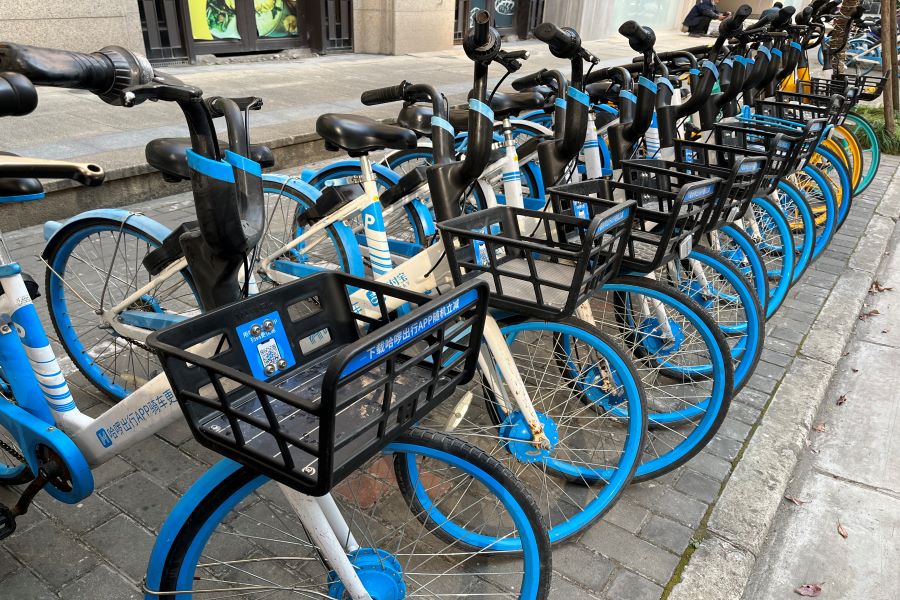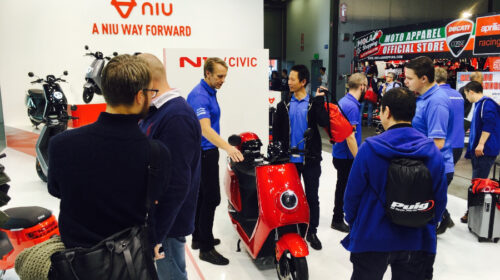Hello Bike Back in Fundraising Fast Lane After Failed IPO Attempt

Shared bike operator raises $280 million from Alibaba and CATL, as it moves focus to becoming electric vehicle specialist
Key points:
- Hello Inc. has raised a fresh $280 million from Alibaba and CATL, bringing its total fundraising this year to $500 million
- Fundraising follows failed U.S. IPO attempt earlier this year, and comes as company adds electric vehicle manufacturing and batter swapping services to its portfolio
By Doug Young
Shared bike operator Hello Inc. may have said “goodbye” to Wall Street earlier this year, when it abruptly pulled its planned U.S. IPO in the face of growing regulatory resistance from both Beijing and Washington. But that hasn’t stopped the money-losing company from raising cash, as it waits to see if and when it might relaunch its IPO plan.
The company made headlines last week when it announced it had raised $280 million in fresh capital, bringing its total fundraising this year to $500 million. That’s quite respectable when one considers the company’s original IPO fundraising target was a modest $100 million.
What’s most interesting about this latest fundraising is who is behind it, namely e-commerce juggernaut Alibaba (BABA.US; 9988.HK) and CATL (300750.SZ), the world’s largest maker of batteries that power electric cars and scooters. The arrival of two such big backers could provide important new support for Hello’s services, which are rapidly expanding.
CATL’s arrival, in particular, also hints at a major directional change for Hello, as it throws its weight increasingly into electric vehicles that fit nicely into Beijing’s bigger plans to promote such technology.
As we’ve said frequently in the past, aligning your business with government policy is one of the key ingredients to success in China. Such alignment not only opens the doors for government financial assistance, but can also lead to favorable regulatory treatment when one needs approvals for things like getting new business licenses and making IPOs.
Hello was notable this year for becoming China’s first standalone shared bike operator to file for an IPO. Its two main competitors, Mobike and Qingju, are owned by much larger internet companies, online-to-offline (O2O) services giant Meituan (3690.HK) and the Uber-like DiDi Global (DIDI.US), respectively.
Its standalone nature put Hello at a competitive disadvantage to its two rivals, since both had wealthy parents who could offer not only cash but also much larger platforms to promote the companies’ shared bike services. Hello did have one similar connection in early backer Ant Group, the Alibaba-affiliated financial giant, which gave Hello’s service special placement on its core Alipay payments service.
At the time of the IPO prospectus filing in April, the largest single source of users for Hello’s shared bike service came from Alipay users. Thus the introduction of Alibaba as a new stakeholder could offer more new places for Hello to peddle its services on Alibaba’s various apps.
It’s less clear where synergies with CATL might come from until one looks closer at Hello’s recent diversification moves since its initial IPO filing. According to a Chinese media report, the company has quietly moved into a number of new businesses this year where CATL could become an important partner, including electric scooter manufacturing and the operation of electric vehicle battery swapping stations.
Building a Retail Network
According to the report, Hello has rolled out three electric scooter models since entering the space in April this year, and is developing a retail network – already comprising 5,000 outlets – to sell those vehicles.
That move looks aimed at a domestic electric vehicle market whose rapid growth is being fueled by Beijing’s aggressive promotion of such technology as it aims to achieve peak carbon emissions by 2030 and go carbon neutral by 2060. The market’s rapid growth was reflected in the latest figures from leading scooter maker Niu Technologies (NIU.US), which last month reported its China scooter sales rose 45% in the first nine months of this year from the year-ago period.
Thus CATL, as a major new strategic stakeholder, could become an important supplier for Hello’s scooter manufacturing, as well as a potential channel for introductions to help Hello build up its retail dealer network.
CATL could also play a role in Hello’s new battery swapping stations. While electric vehicle charging stations often get most of the attention in discussions about electric vehicle infrastructure, battery swapping stations are also playing an increasingly high-profile role. Such stations provide a quicker alternative for vehicle owners who may want to quickly swap out a depleted battery rather than wait for a recharge.
CATL was already an early investor in Hello’s new battery-swapping venture before making its new investment in Hello at the parent level.
All of this does indeed make Hello look increasingly like an electric vehicle play, or perhaps a zero-emissions play is more apt to describe the company after including its original shared bike service. Its original shared bike and scooter services accounted for 91% of the company’s revenue last year, according to its earlier prospectus. In a somewhat worrisome trend, revenue from that part of the service actually fell in every quarter of last year from the same quarter a year earlier, most likely due to stiff competition.
Thus the introduction of the new businesses, as well as potential new channels for selling its core bike sharing business, could help to revive Hello’s prospects. The company’s net loss attributable to ordinary shareholders ballooned by 50% last year to 4.5 billion yuan ($705 million), accelerating from a 15% growth rate for the loss the previous year, according to the prospectus.
Known for its trademark blue-and-white bikes that are a fixture on streets in most major Chinese cities, Hello took its current form in 2017 when it merged with Youon, one of China’s earliest shared bike operators. Ant Group invested in the company and was its largest single stakeholder with 36.3% of the company at the time of the IPO prospectus filing. Youon held 7% at that time, while other investors included domestic giant Fosun Group and Primavera Capital.
At the end of the day, this latest fundraising relatively encouraging by showing the company is still able to attract that kind of big money it will probably need for at least the next couple of years while it tries to become profitable.
The new synergies it will get from CATL and Alibaba could be important catalysts in that drive, and strong government support will also be quite helpful. Such support could also ultimately help Hello to relaunch its IPO, though it’s quite possible any future listing plan might get moved to Hong Kong or even to the Chinese mainland.
To subscribe to Bamboo Works free weekly newsletter, click here





